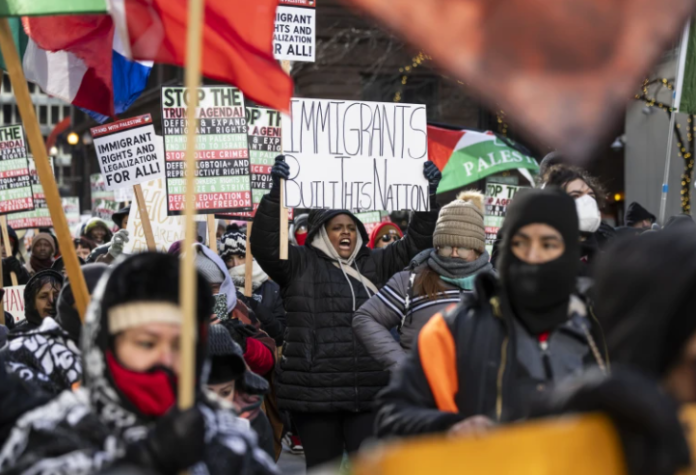In the days following Donald Trump’s second presidential term, Riccy, an immigrant from Honduras living in Chicago for seven years, has become more cautious, fearing immigration officials could show up at any time. As a mother of four, she worries about the impact on her family. She has even prepared legal documents in case she is separated from her children. Despite her fears, Riccy remains vocal and participates in advocacy events, rallying with others to support immigrant workers. “My community gives me the strength to raise my voice,” she says, determined to spread awareness about immigrant rights.
Uncertainty and Anxiety
Although rumors of large-scale immigration raids in Chicago haven’t materialized, fear remains widespread. False reports of U.S. Immigration and Customs Enforcement (ICE) sightings have circulated, adding to the tension. ICE has not confirmed any detentions in the area, but new policies allowing immigration arrests in sensitive places like schools have heightened concerns.
Chicago Public Schools (CPS) has reassured families that federal agents cannot enter schools or access student records without a judge-approved warrant. CPS CEO Pedro Martinez emphasized that all students have a right to education, regardless of their immigration status. Local laws, such as the Illinois Trust Act and Chicago’s Welcoming City Ordinance, further protect against collaboration between local police and ICE. However, these protections don’t apply to all schools, especially in suburban areas, prompting advocates to urge schools to adopt similar policies.
Churches, historically involved in sanctuary movements, are also preparing for potential ICE raids. Religious leaders like Rev. Beth Brown of Lincoln Park Presbyterian Church are educating their communities about legal protections for places of worship. Signs declaring “No ICE Entry” are being placed in churches across Chicago.
Expanding ICE Targets
Under Trump’s administration, ICE has broadened its focus, targeting not only immigrants with serious criminal records but also those with minor offenses. Advocates warn that even low-level violations, such as a decades-old DUI or petty theft, could lead to deportation. For example, Antonio Gutierrez, who faced a DUI charge 13 years ago, fears becoming a target despite being a law-abiding resident today.
Policies like the proposed Laken Riley Act could make immigrants more vulnerable by allowing deportation for minor offenses. Advocates argue that such measures unfairly criminalize individuals and increase the likelihood of deportation for nonviolent crimes often linked to poverty.
Public vs. Private Spaces
Advocates are educating immigrants about the difference between public and private spaces, as ICE agents need a judicial warrant to access private areas. For example, in workplaces like restaurants, agents can enter public areas but cannot access private spaces such as kitchens without proper authorization. Similarly, if ICE agents attempt to enter a home, individuals are advised to ask for a judicial warrant and verify its details carefully.
Community organizations like Centro de Trabajadores Unidos are conducting “know your rights” workshops to help immigrants understand their legal protections. They emphasize that their spaces will remain safe zones, refusing to cooperate with ICE activities.
Legal Defense Efforts
Local attorneys are working to support immigrants at risk of deportation by preparing legal tools and training public defenders unfamiliar with immigration law. Illinois law prevents jails from holding immigrants for ICE, but agents can still make arrests outside facilities or conduct random raids. ICE also has access to federal databases for private information.
ICE agents often use deceptive tactics, such as posing as police officers, to gain entry into private properties. Once detained, immigrants without serious criminal records may be eligible for release on bond, but those with deportation orders or violent offenses are transferred to ICE facilities in surrounding states.
While Chicago and Illinois sanctuary laws offer some protection, any interaction with the criminal justice system—even for minor issues—can increase the likelihood of ICE enforcement. Advocates urge immigrants to stay informed, seek legal help, and remain cautious about their rights and vulnerabilities.
By standing together and staying informed, immigrants and their communities can navigate these challenging times while continuing to advocate for fairer policies.





